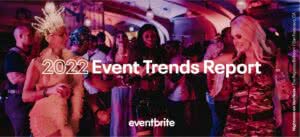For many creators, the sudden shift to online events after COVID-19 was a leap into the unknown.
“I had never even been to an online event before all of this,” says Radha Agrawal, CEO and co-founder of global morning dance community Daybreaker. So for Agrawal and many others, it was a gradual process of understanding the behavior of online attendees and the content they were looking for.
More and more brands are venturing into the world of online events — and are wondering what kind of events resonate with attendees. To help you make sense of it all, we used our data to tease out the most popular types of events, pricing trends, and other valuable insights creators can use to craft well-attended, profitable events.
A hunger for professional development
According to our data, attendees are drawn to Business & Professional online events, buying about a quarter of all tickets sold in that category since shelter-in-place began. This is likely due to the closure of many large venues, which means in-person business conferences are being replaced with online alternatives.
And at a time when job security is threatened in many fields, it seems like people are flocking online to improve their skills with webinars, professional development classes, and networking activities.
The power of escape
Although many people are looking for professional and intellectual growth, some creators have realized that it’s just as important to have programming that takes people’s minds off of current events.
This likely explains why Community & Culture, Performing & Visual Arts, and Film, Media & Entertainment are among the most popular event categories on Eventbrite. This desire for community and escape is part of the reason Daybreaker has reached more than 30,000 people from 85 different countries in its first 11 livestream events. People are looking for an escape from their daily life stuck indoors, whether that’s through an arts and crafts tutorial, a ballet class, or a virtual trip through a museum.
Health & Wellness is another popular category, which includes at-home fitness classes, meditation sessions, and more. The popularity of these events tells us that mental health and self-care are as important as ever, especially at a time when people might be anxious about COVID-19 or their financial situation.
Fresh content, building community
Online events remain consistently attended and, according to our surveys, attendees plan to continue attending online events even after restrictions have been lifted. Specifically, 71% of participants said they would continue participating in some online/virtual events along with live events.
Keeping the content fresh week after week is key to consistent interest, says Agrawal. For her, it’s about engaging her community in a few different ways. “Giving each event a theme, a unique title, and some different prompts for the attendees make the events feel more special and builds intimacy between everyone there,” she says. Keeping the event at the same time each week is another way Daybreaker builds consistency for its programming.
The team at Manny’s, a San Francisco-based community center that has moved to online events, has built intimacy by encouraging participation among the attendees, through introductions and Q&As.
“I want it to be interactive,” says Emanuel Yekutiel, founder of Manny’s. “That’s why we ask people to raise their hands when they’ve joined the Zoom call, and I talk to the participants and we’ve done a couple of polls, which has been fun. And we always leave 10 minutes for Q&A, so everyone gets to interact with the speaker.”
Ticket prices vary considerably
Ticket prices range from $0 to nearly $100, proving that pricing isn’t a barrier for entry to these events. And in some cases, people are willing to spend just as much for an online event as they would for an in-person event.
Of course, not every event calls for attendees to open their wallets. Free tickets are purchased far more frequently than priced tickets, and they give creators an effective way to make their events inclusive to a wider audience. And if you don’t want to make your event cost-prohibitive but would still like the chance to make some money on your event, allowing donations is a popular option for creators. Learn more about ticketing strategies for online events here.
So what will your next online event be like? And how will you use these learnings to grow your audience and keep them engaged? To get started, check out how you can attract more attendees to your events.




